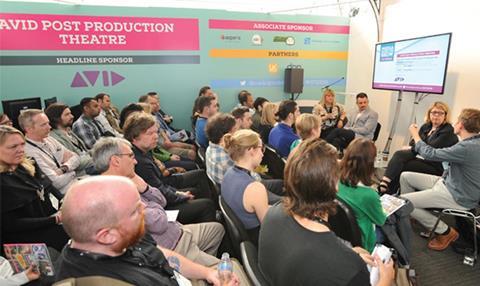The post-production industry is enjoying a boom in work, but the usual pressures, caused by stagnant rates and the availability of talent, remain.

Speaking during the Post Production: State of the Nation panel discussion at the Media Production
Show, the bosses of three post facilities working across TV, film and commercials painted a picture of an industry in rude health, despite the challenges it faces.
The Farm co-founder Nicky Sargent said: “The volume of work is at the highest I have seen in the past 25 years. However, the pressure on us all to maintain profits is higher than I have seen. Ours is a very stable market and some large facilities have been around for a long time, which means we have some good practices. Clients are getting a lot from us.
“We are technically recognised as excellent throughout the world and we are a high exporter. So TV post-production is strong and safe, and has to be applauded for weathering the bad times.”
Goldcrest Post managing director Patrick Malone cited the tax breaks for film and high-end TV as one of the principal reasons for the largely buoyant mood in the post industry.
He said: “[Tax breaks are] driving so much business into town, and we are all benefiting from it. We are all doing a good job of responding to it and looking after all these projects. I don’t know how things would look if people couldn’t exploit that credit.”
Rushes managing director Joce Capper said that while tax breaks had no direct impact on those providing post services for commercials, there was an indirect benefit to those working in commercials, and to the industry as a whole.
But, she added: “If any work falls away from London, the larger companies suck it up, which makes it much more challenging for everyone else.”
Sargent said that some four years ago – partly because of the campaign for tax breaks – The Farm had identified drama as a growth market. The genre now accounts for 30-40% of the facility’s work.
Malone, who has overseen Goldcrest’s expansion into high-end picture post for features and TV drama over the past couple of years, raised the prospect of other countries implementing financial incentives.
“I’m not overly concerned about the status of the tax breaks being taken away [by the government] but other regions could cotton on to the idea and create tax breaks that are more enticing.”
Call for UK Screen rate hike
The amount that post-production companies are able to charge clients is a perennial issue for the industry. According to Malone, even inflationary increases are a “shock” to some productions in what Rushes’ Joce Capper described as “a client’s market with overcapacity”.
Sargent said she felt that facilities trade body UK Screen could do more to help post firms push up rates. “[The Farm] is no longer a member [of UK Screen] because we felt no one was acting for the greater good of the community and we feel there should be some collective bargaining.”
Later, when audience members were invited to put questions to the panel, UK Screen chief executive Neil Hatton described the period when The Farm was a member of UK Screen, some seven or eight years ago, as “a different era”. He said: “It was a period of terrible attrition. Everybody was cutting throats left, right and centre… we could never have agreed terms of trade because immediately someone would have broken it. It is different now.”
Hatton pointed to UK Screen’s lobbying for tax breaks as “the kind of boost to business that we have been campaigning for, and it’s great to see post-production benefiting from it”.
Brexit mixed reaction to referendum
Rushes managing director Joce Capper raised the issue of the UK’s possible exit from the European Union, which she said would make it even more difficult for post firms to recruit the talent required by the industry.
“If the pool of talent gets smaller, that will definitely affect every sector of the industry,” she said. “We produce content for the UK and the rest of the world, with multiple versions of commercials, so if we are not working with a large diverse and creative team, the kind of content we produce could be affected.”
But Goldcrest’s Patrick Malone said he felt concerns about the impact were “overplayed”, adding: “No one really knows what the fallout will be. There might be some uncertainty about the work status of some staff if we were to leave, but I am sure we could overcome that without too much bother. The reasons to work here, to shoot here, to post here, should remain unaffected if we were to leave.”

























No comments yet